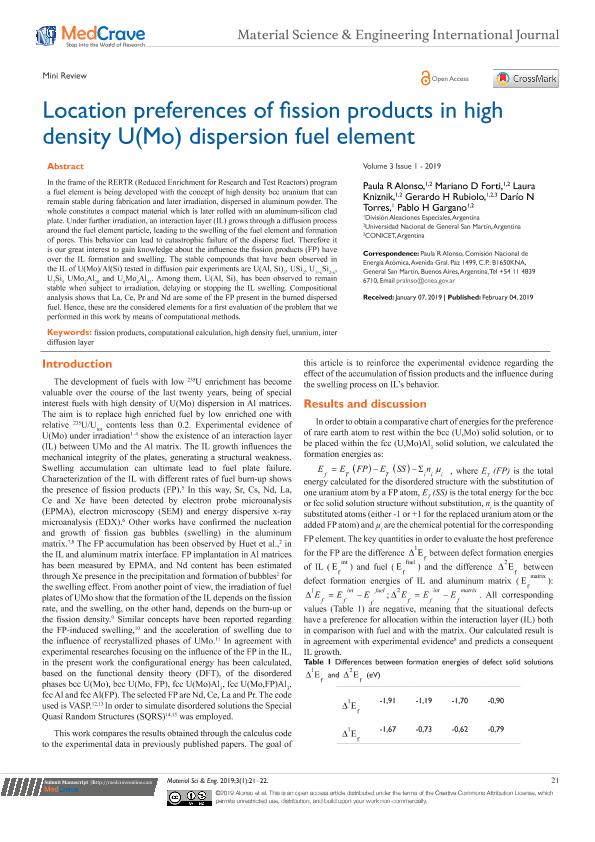Mostrar el registro sencillo del ítem
dc.contributor.author
Alonso, Paula Regina

dc.contributor.author
Forti, Mariano D.
dc.contributor.author
Kniznik, Laura

dc.contributor.author
Rubiolo, Gerardo Hector

dc.contributor.author
Torres, Dario Nelson

dc.contributor.author
Gargano, Pablo Hugo

dc.date.available
2020-11-27T11:45:35Z
dc.date.issued
2019-02
dc.identifier.citation
Alonso, Paula Regina; Forti, Mariano D.; Kniznik, Laura; Rubiolo, Gerardo Hector; Torres, Dario Nelson; et al.; Location preferences of fission products in high density U(Mo) dispersion fuel element; MedCrave; Material Science & Engineering International Journal; 3; 1; 2-2019; 21-22
dc.identifier.uri
http://hdl.handle.net/11336/119187
dc.description.abstract
In the frame of the RERTR (Reduced Enrichment for Research and Test Reactors) program a fuel element is being developed with the concept of high density bcc uranium that can remain stable during fabrication and later irradiation, dispersed in aluminum powder. The whole constitutes a compact material which is later rolled with an aluminum-silicon clad plate. Under further irradiation, an interaction layer (IL) grows through a diffusion process around the fuel element particle, leading to the swelling of the fuel element and formation of pores. This behavior can lead to catastrophic failure of the disperse fuel. Therefore it is our great interest to gain knowledge about the influence the fission products (FP) have over the IL formation and swelling. The stable compounds that have been observed in the IL of U(Mo)/Al(Si) tested in diffusion pair experiments are U(Al, Si)3, USi2, U1+xSi2-x, U3Si5 UMo2Al20 and U6Mo4Al43. Among them, U(Al, Si)3 has been observed to remain stable when subject to irradiation, delaying or stopping the IL swelling. Compositional analysis shows that La, Ce, Pr and Nd are some of the FP present in the burned dispersed fuel. Hence, these are the considered elements for a first evaluation of the problem that we performed in this work by means of computational methods.
dc.format
application/pdf
dc.language.iso
eng
dc.publisher
MedCrave
dc.rights
info:eu-repo/semantics/openAccess
dc.rights.uri
https://creativecommons.org/licenses/by-nc/2.5/ar/
dc.subject
FISSION PRODUCTS
dc.subject
COMPUTATIONAL CALCULATION
dc.subject
HIGH DENSITY FUEL, URANIUM
dc.subject
INTER DIFFUSION LAYER
dc.subject.classification
Ingeniería de los Materiales

dc.subject.classification
Ingeniería de los Materiales

dc.subject.classification
INGENIERÍAS Y TECNOLOGÍAS

dc.title
Location preferences of fission products in high density U(Mo) dispersion fuel element
dc.type
info:eu-repo/semantics/article
dc.type
info:ar-repo/semantics/artículo
dc.type
info:eu-repo/semantics/publishedVersion
dc.date.updated
2020-11-16T20:34:11Z
dc.identifier.eissn
2574-9927
dc.journal.volume
3
dc.journal.number
1
dc.journal.pagination
21-22
dc.journal.pais
Estados Unidos

dc.description.fil
Fil: Alonso, Paula Regina. Universidad Nacional de San Martín; Argentina. Consejo Nacional de Investigaciones Científicas y Técnicas; Argentina
dc.description.fil
Fil: Forti, Mariano D.. Universidad Nacional de San Martín; Argentina
dc.description.fil
Fil: Kniznik, Laura. Universidad Nacional de San Martín; Argentina
dc.description.fil
Fil: Rubiolo, Gerardo Hector. Universidad Nacional de San Martín; Argentina. Consejo Nacional de Investigaciones Científicas y Técnicas; Argentina
dc.description.fil
Fil: Torres, Dario Nelson. No especifíca;
dc.description.fil
Fil: Gargano, Pablo Hugo. Universidad Nacional de San Martín; Argentina. Consejo Nacional de Investigaciones Científicas y Técnicas; Argentina
dc.journal.title
Material Science & Engineering International Journal
dc.relation.alternativeid
info:eu-repo/semantics/altIdentifier/url/https://medcraveonline.com/MSEIJ/MSEIJ-03-00083.pdf
dc.relation.alternativeid
info:eu-repo/semantics/altIdentifier/url/https://medcraveonline.com/MSEIJ/location-preferences-of-fission-products-in-high-density-umo-dispersion-fuel-elementnbsp.html
Archivos asociados
